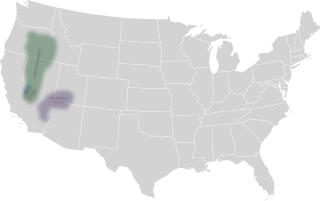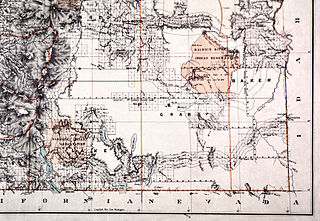
Paiute refers to three non-contiguous groups of indigenous peoples of the Great Basin. Although their languages are related within the Numic group of Uto-Aztecan languages, these three groups do not form a single set. The term "Paiute" does not refer to a single, unique, unified group of Great Basin tribes, but is a historical label comprising:

Sarah Winnemucca Hopkins was a Northern Paiute author, activist and educator.

Pyramid Lake is the geographic sink of the basin of the Truckee River, 40 mi (64 km) northeast of Reno, Nevada, United States.

The Northern Paiute people are a Numic tribe that has traditionally lived in the Great Basin region of the United States in what is now eastern California, western Nevada, and southeast Oregon. The Northern Paiutes' pre-contact lifestyle was well adapted to the harsh desert environment in which they lived. Each tribe or band occupied a specific territory, generally centered on a lake or wetland that supplied fish and waterfowl. Communal hunt drives, which often involved neighboring bands, would take rabbits and pronghorn from surrounding areas. Individuals and families appear to have moved freely among the bands.
Cherie is an English female given name. It comes from the French chérie, meaning darling.
The Bannock War of 1878 was an armed conflict between the U.S. military, and Bannock and Paiute warriors in Idaho and Northeastern Oregon from June to August 1878. The Bannock totaled about 600 to 800 in 1870 because of other Soshonean peoples being included with Bannock numbers; they were led by Chief Buffalo Horn, who was killed in action on June 8, 1878. After his death, Chief Egan led the Bannocks. He and some of his warriors were killed in July, by a Umatilla party that entered his camp in subterfuge.
Richard Egan may refer to:

The Southern Paiute people are a tribe of Native Americans that have lived in the Colorado River basin of southern Nevada, northern Arizona, and southern Utah. Bands of Southern Paiute live in scattered locations throughout this territory and have been granted federal recognition on several reservations.

The Paiute War, also known as the Pyramid Lake War, Washoe Indian War and the Pah Ute War, was an armed conflict between Northern Paiutes allied with the Shoshone and the Bannock against settlers from the United States, supported by military forces. It took place in May 1860 in the vicinity of Pyramid Lake in the Utah Territory, now in the northwest corner of present-day Nevada. The war was preceded by a series of increasingly violent incidents, culminating in two pitched battles in which 79 Whites and 25 Indigenous people were killed. Smaller raids and skirmishes continued until a cease-fire was agreed to in August 1860; there was no treaty.

Winnemucca was a Northern Paiute war chief. He was born a Shoshone around 1820 in what would later become the Oregon Territory.

The Malheur Indian Reservation was an Indian reservation established for the Northern Paiute in eastern Oregon and northern Nevada from 1872 to 1879. The federal government discontinued the reservation after the Bannock War of 1878, under pressure from European-American settlers who wanted the land. This negative recommendation against continuing by its agent William V. Rinehart, the internment of more than 500 Paiute on the Yakama Indian Reservation, also the reluctance of the Bannock and Paiute to return to the lands after the war.
Tamra is an Arab city in the Lower Galilee in Israel.
Egan is the American name given to Pony Blanket. Pony Blanket was a Northern Paiute leader in the Oregon Country in the 19th century.
Cían, modern spelling Cian, is a Gaelic given name meaning "ancient". Cian was the eighth most popular Irish boys name in Ireland in 2003, and the fourteenth most popular in 2015. The English variant of Cian is Kian or Kyan.

Snake Indians is a collective name given to the Northern Paiute, Bannock, and Shoshone Native American tribes.
Joe or Joseph Egan may refer to:
Frank Vincent may refer to:
Egan is a surname that comes from the Irish Gaelic name Mac Aodhagáin. It is derived from the root 'aedh' meaning little fire and the diminutive 'an' hence 'the little bright-eyed one'. Variations include: Egan, Eagan, Keegan, McKeegan, MacEgan, Kegan, Keagan and Egen. The name originates from County Tipperary (north). The Egans have been around for thousands of years and own a castle in Tipperary, Ireland. That castle is Redwood Castle.

Numaga was a Paiute leader during the Paiute War of 1860 that centered on Pyramid Lake in what is now Nevada in the United States. The war was caused by an influx of miners and ranchers after silver was discovered in the Comstock Lode near to Carson City. The newcomers assaulted the Paiutes and destroyed their foods supplies. When the Paiutes responded, the U.S. Army used force to suppress them. Both before and after the war, Numaga was a strong advocate of peace and did much to reduce the violence on both sides. He died of tuberculosis, a "white man's disease", in 1871.
This page is based on this
Wikipedia article Text is available under the
CC BY-SA 4.0 license; additional terms may apply.
Images, videos and audio are available under their respective licenses.









